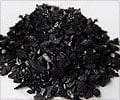Chemists at the University of Sheffield have developed innovative water-soluble molecules which can safely release small amounts of carbon monoxide (CO) gas inside the human body, and thereby provide several health benefits to patients who have undergone heart surgery or organ transplants, and to people suffering from high blood pressure.
The researchers say that the new molecules may be administered to patients either orally or through injections. The researchers say that the gas is lethal when inhaled in large amounts, but administering it in small doses to patients can reduce inflammation, widen their blood vessels, increase blood flow, and prevent unwanted blood clotting. They said that small doses of carbon monoxide could even suppress the activity of cells and macrophages which attack transplanted organs.Researchers have for long known that CO is produced in the body as part of its own natural defensive systems, and that delivering the right dose of the gas to the patient may provide him with several advantages.
However, the big question before them was how to administer the right dose of CO to patients safely, as the conventional method of gas inhalation could expose patients to high doses. The new CO-releasing molecules (CO-RMs) have been developed in partnership with Dr Roberto Motterlini at Northwick Park Institute for Medical Research (NPIMR) and with funding from the Engineering and Physical Sciences Research Council (EPSRC).
“The molecules dissolve in water, so they can be made available in an easy-to-ingest, liquid form that quickly passes into the bloodstream,” says Professor Brian Mann, from the University's Department of Chemistry, who led the research. “As well as making it simple to control how much CO is introduced into a patient’s body, it will be possible to refine the design of the molecules so that they target a particular place while leaving the rest of the body unaffected,” he added.
The CO-RMs consist of carbonyls of metals such as ruthenium, iron, and manganese which are routinely used in clinical treatments. They can be designed to release CO over a period of between 30 minutes and several hours, depending upon the treatment required for a particular medical condition.
The researchers said that the new molecules could help reduce the time that patients need to spend in hospital, besides enabling some patients to avoid going into hospital in the first place. “This project provides an excellent example of how non-biological sciences like chemistry can underpin important advances in healthcare,” said Professor Mann.
Advertisement
Source-ANI
LIN/V






